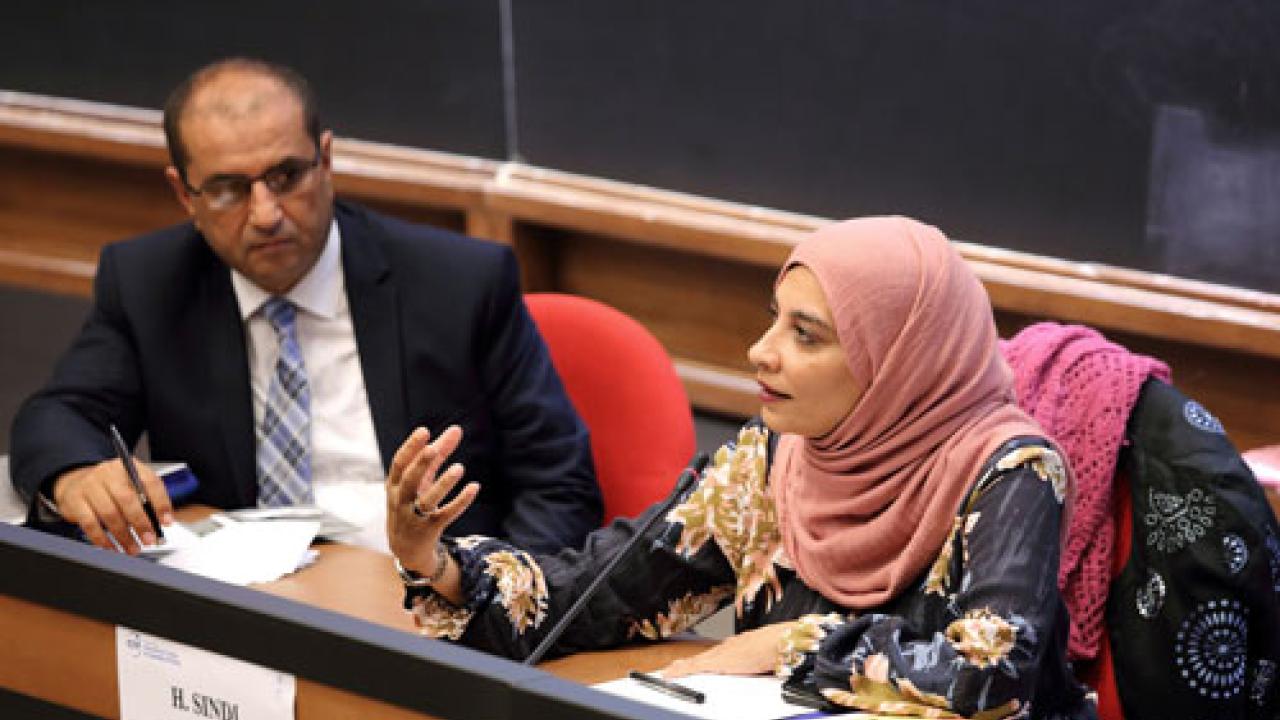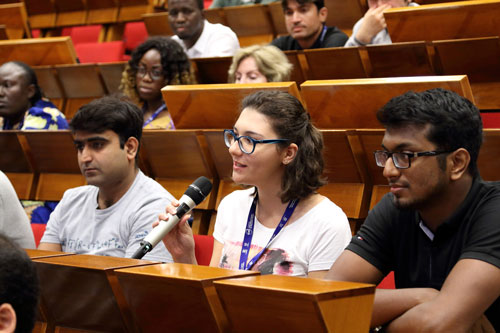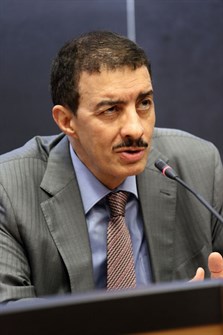
ICTP recently hosted a visit by high-level representatives from the Islamic Development Bank (IDB), offering a unique opportunity for the bank to connect with the Centre’s students and scientists from IDB member countries.
His Excellency Dr. Bandar Hajjar, the president of the IDB Group, and Dr. Hayat Sindi, IDB Advisor for Science, Technology, and Innovation and a UNESCO Goodwill Ambassador, presented the work of the bank and then opened a question and answer session with the ICTP students and scientists, who represented a majority of the IDB’s 57 member countries.
The IDB is interested in fostering economic and social progress by providing funding opportunities and technical assistance to its members. Inspired by the great scientific and other developments in the ancient Arab world, the IDB works to build human capital and capacity through projects that help alleviate poverty, improve health, increase access to education, improve governance, and increase overall prosperity.
 The ICTP audience learned that the IDB is interested in supporting scientists, especially when their work is easily and quickly translatable into applicable social benefits. "We face grave challenges, so we are looking for solutions, and quickly," said Dr. Sindi. The IDB is hoping to help LDCs work towards the United Nations Sustainable Development Goals, covering areas such as food security, education, poverty eradication, and clean water supplies. "We want students who are specifically trained to focus on the Sustainable Development Goals," says Dr. Hajjar.
The ICTP audience learned that the IDB is interested in supporting scientists, especially when their work is easily and quickly translatable into applicable social benefits. "We face grave challenges, so we are looking for solutions, and quickly," said Dr. Sindi. The IDB is hoping to help LDCs work towards the United Nations Sustainable Development Goals, covering areas such as food security, education, poverty eradication, and clean water supplies. "We want students who are specifically trained to focus on the Sustainable Development Goals," says Dr. Hajjar.
To that end, the IDB signed an agreement with The World Academy of Sciences (TWAS) while they were in Trieste, paving the way for training workshops, especially in science policy and science communication. The IDB is also hoping to support programmes that help refugee scientists resettle and rebuild their careers, as well as postdoctoral fellowships for scientists from the Least Developed Countries (LDCs) among its member states, to be completed at regional centers of excellence.
 The majority of scientists at ICTP focus on basic science, but that doesn't mean the meeting attendees did not have more immediately applicable ideas up their sleeves. The delegation fielded several questions about how developed ideas needed to be before they might be funded. "We are open to ideas at all different stages," said Dr. Sindi, adding, "There are a lot of funding agencies worldwide that fund basic research. We want to help people with ideas reach and benefit society, through mentorship and funding." The IDB delegates welcomed and encouraged future dialogue with the ICTP community.
The majority of scientists at ICTP focus on basic science, but that doesn't mean the meeting attendees did not have more immediately applicable ideas up their sleeves. The delegation fielded several questions about how developed ideas needed to be before they might be funded. "We are open to ideas at all different stages," said Dr. Sindi, adding, "There are a lot of funding agencies worldwide that fund basic research. We want to help people with ideas reach and benefit society, through mentorship and funding." The IDB delegates welcomed and encouraged future dialogue with the ICTP community.
Prior to meeting with ICTP’s scientists and students, the IDB delegates spent time learning about the international organizations in Trieste. Representatives from ICTP, TWAS and the organizations it hosts—the InterAcademy Partnership and the Organization for Women in Science for the Developing World—introduced their work, as did a representative from the International Centre for Genetic Engineering and Biotechnology.
















